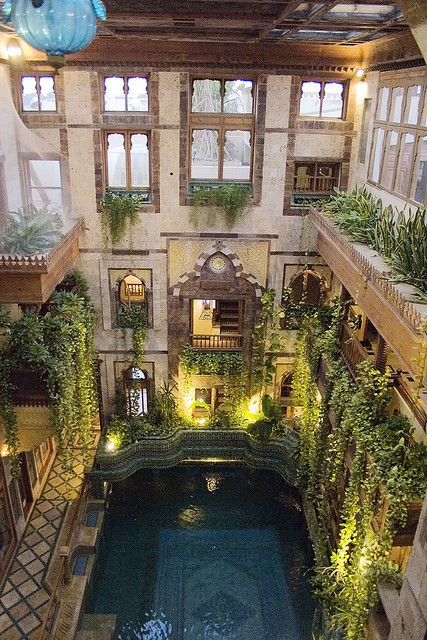Le Saboteur
Active member
Knowledge brings a great reward. The one who points the way to something good is like the one who does it. When the knowledgeable person dies, his reward with Allah does not cease when he dies, rather it continues to increase so long as people benefit from his knowledge. The Prophet (may Allah exalt his mention) said: "When a man dies, all his deeds come to an end except for three — an ongoing charity, beneficial knowledge or a righteous child who will pray for him.
In 2007 while the Family Jones was lounging around <del>Hawaii</del>... er, Peru and the Family O'Connell was barnstorming around China, a crew from National Geographic was in the deserts of Morocco attempting to bring one of Islam's holiest sites, the Kaaba, to life for the purpose of bringing the 14th Century Hajj to the silver screen.
The end result of their effort was Journey to Mecca: In the Footsteps of Ibn Battuta, a 45-minute docu-drama on perhaps the world's greatest traveler, Ibn Battuta.
Unfortunately the film's length allows the viewer only a brief look into who Ibn Battuta was and who he came to be.
When he undertook his travels, Ibn Battuta was a 21-year old law student. Inspired by a dream to undertake the Hajj, he left his home of Tangier in northern Morocco in 1325. A journey of some 3-thousand miles, it would take him from Morocco to Cairo, the Mother of the World, Jerusalem, Aleppo and Damascus before finally to Mecca some three years later. While traveling he documented much of what he saw in his diary; a lawyer, theologian, and poet his accounts of the medieval Eastern world are often our only primary source.
He would eventually make seven pilgrimages to the Holy City over his lifetime, but his travels would take him to Spain, Turkey, Persia, Russia, and the assorted Arab lands. Following a three year stay in Mecca after his second pilgrimage, Battuta turned his attention to the Far East. After touring through Syria and Egypt he found himself in the court of the Sultan of Delhi. After being accepted into the Sultan’s entourage, he would spend eight years as a qadi, a local judge, before being sent to China to act as the Sultan’s ambassador.
That journey would make even the most two-fisted adventurer green with envy. As soon as he departed Delhi, he would be captured by bandits and marked for death if one of their band hadn’t taken pity on him and allowed Battuta to escape in the night. Following an eight day manhunt, he would finally rejoin his entourage in Calicut, a trading port near India’s tip. Weather would become his enemy here as the junk loaded with gifts for the Chinese court was smashed against the shoals during a storm, and the smaller vessel made off with his few personal belongings in the confusion.
Ibn Battuta would eventually make to China following a stint in the Maldives, becoming the first person in history to record those islands' histories and customs. Upon his eventual return to Tangier 24-years later he would become the most celebrated traveler in the world outdoing both Marco Polo and Columbus. Not until the Age of Steam would his feats be equaled.
Do check out his Rihla (Travels) available at finer booksellers everywhere. The University of California at Berkeley also has fine repository of his journey available on-line.
Now back to the movie.
It's a sumptuously filmed piece; the reported $13-million went to good use in recreating the 14th Century world. The costumes are superb, as are the locations. There's even a sandstorm to rival anything Hidalgo could digitally conjure. They've also assembled the largest caravan ever to be caught on film for Ibn Battuta's first pilgrimage to Mecca. It's even bigger than the one in Lawrence of Arabia! According to the producers, it features 500 people in period costume, 330 camels (Watch out! They spit.), and 660 donkeys, sheep, and goats.
Bookending Battuta’s first trip are scenes from 2007’s Hajj. Hajjis arrive at Islam’s holiest city via car, plane, and boat. From all walks of life they venture to Mecca in order to reaffirm their faith, and to deepen their sense of ‘oneness’, or tawheed. Despite their social and economic background, it is all set aside during the 5-days of the Hajj to remind them that “we’re all one before God.”
For outsiders, this might be where the movie shines. It takes a concept, the Hajj, and breaks into down into what happens on what day and the significance behind it. It has my endorsement just for this aspect.

Dig that image quality. IMAX features usually lose something when being transferred to home video, but this one stands out. The aerial photography is nothing short of stunning, and the details are vividly clear. Do yourself a favor and pick it up on Blu-ray.
But if you're a cheap or lazy bastard, it is available on the 'net. Sam Earch could help you find it if you're so inclined.
Background reading:
Mecca Development Veers to Kitsch
In Mecca, a Hotel Boom
The late Sheikh Hamza Shakkur and his Al Kindi Ensemble provide a significant portion of the soundtrack.
Finally, the movie's original site has a lot of other videos and other background material.
Journey to Mecca Giant Screen
Last edited:
